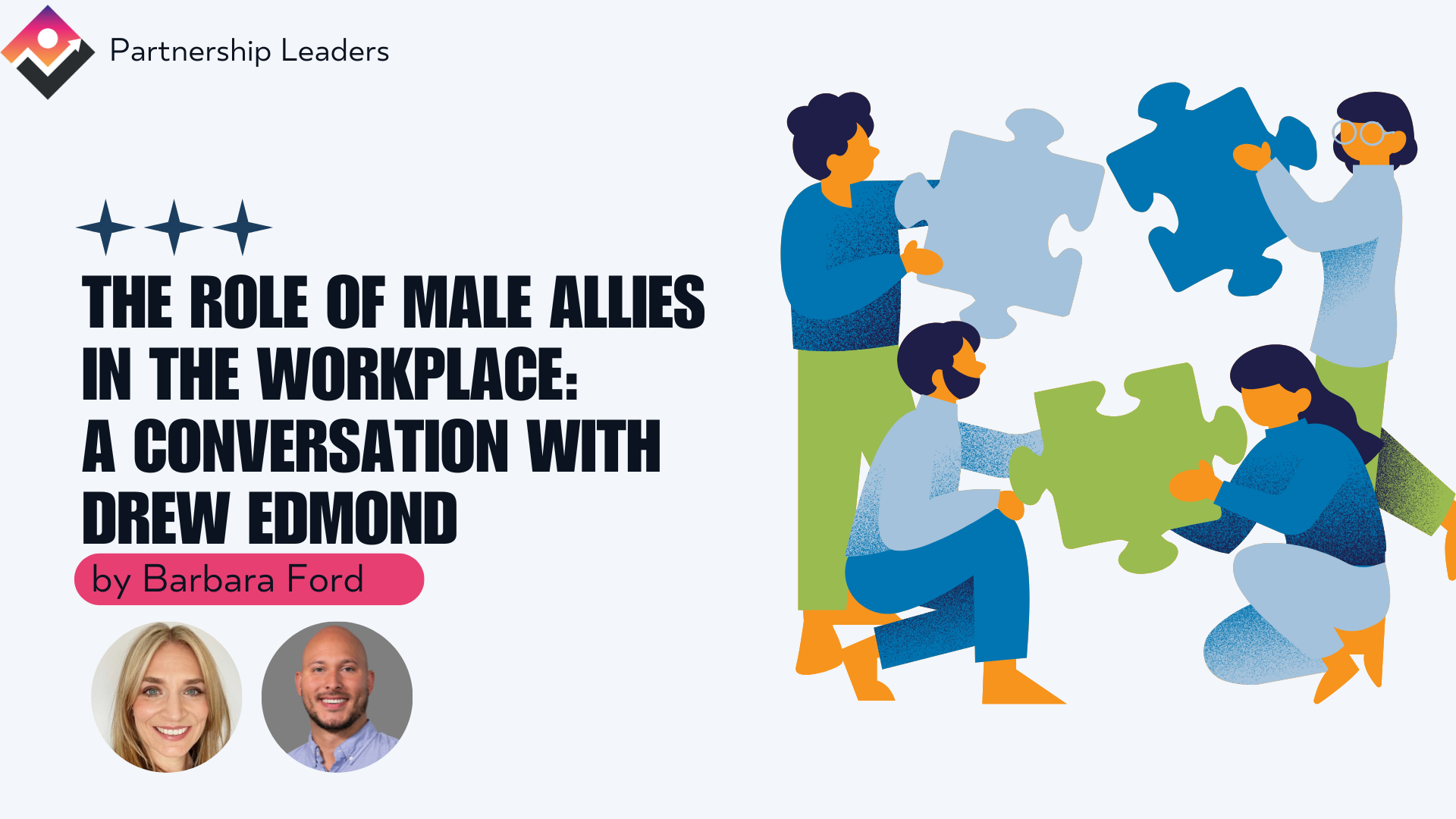International Women’s Day is approaching and we not only celebrate women’s achievements but also recognize our male allies’ crucial role. At Women in Partnerships, we believe that true progress comes from shared commitment, and by empowering our male colleagues, we’re building more inclusive and equitable workplaces for everyone.
To dive deeper into this topic, Barbara Ford sat down with Drew Edmond, Associate Partner at Glenbrook Partners, a strategy consulting firm specializing in payments, risk, and identity authentication. Drew has spent years working across the payments ecosystem, collaborating with major merchants, payment service providers, and networks. But beyond his professional expertise, he brings thoughtful insight into the challenges women face at work and how male allies can help drive change.
The State of Women in the Workplace
Barbara asked Drew where he sees women standing in the workplace today and if he’s witnessed situations where women were treated differently. His response was both thoughtful and candid.
“I’ve been fortunate to work at companies like Square, Etsy, and now Glenbrook, where I’ve been surrounded by incredible women in leadership roles. I don’t think I’d be where I am today without the guidance and mentorship I’ve received from women throughout my career.”
At the same time, Drew acknowledged that while many organizations are making strides toward diversity, challenges persist—particularly the way women are perceived when they exhibit strong leadership traits.
“Women often have to walk this narrow line of assertiveness that men don’t even have to think about. If they’re too assertive, they might be labeled as ‘bossy’ or worse. If they aren’t assertive enough, they risk being overlooked. It’s a constant emotional navigation that men rarely have to consider.”
This double standard isn’t new, but it remains one of the biggest barriers women face in the workplace. Many women find themselves adjusting their tone, word choices, and leadership style in ways their male counterparts never have to, just to be taken seriously.
The Reality of Workplace Bias & Harassment
Beyond navigating bias, workplace harassment remains a persistent issue.
“Despite all the training and policies in place, I still hear stories from women experiencing harassment—whether from coworkers, vendors, or clients,” Drew said. “These things shouldn’t be happening in 2025, yet they still do.”
Drew also shared an anecdote about a friend who was bluntly told early in her career:
“You’re going to have to work twice as hard to be seen as equal.” This wasn’t a personal critique, but rather a harsh truth about systemic inequality. Women—especially women of color—often find themselves needing to overperform just to receive the same level of recognition as their male peers.
What Can Male Allies Do?
So, how can men actively contribute to making workplaces more equitable? Drew offered several insights:
1. Challenge Bias—Even in Private Conversations
“If you hear a male colleague making a dismissive comment about a woman’s leadership style, call it out. Even if it’s behind closed doors, those conversations shape company culture. If you stay silent, you’re complicit.”
2. Support & Celebrate Women’s Achievements
“Women shouldn’t have to constantly self-promote to get the recognition they deserve. As a leader, I try to amplify women’s contributions—whether it’s giving credit in meetings, advocating for promotions, or ensuring their voices are heard.”
3. Create an Environment Where Women Can Succeed
“Organizations should foster cultures where women don’t have to ‘succeed despite men.’ It’s not enough to avoid being part of the problem—you have to actively be part of the solution.”
4. Be Aware of Unconscious Bias
Drew and Barbara spoke about how even well-intentioned men can sometimes reinforce gender bias without realizing it, even little things. Self-awareness is key.
Advice for Women in the Workplace
While men must take responsibility for change, Drew also shared advice for women navigating these challenges:
- Own What You Can Control – “You can’t change every aspect of workplace culture overnight, but you can control how you advocate for yourself.”
- Make Your Work Visible – “If you’re working twice as hard, make sure leadership sees the impact. Self-advocacy is critical.”
- Build a Strong Network – “Surround yourself with mentors and peers who uplift and support you. Community matters.”
Final Thoughts: Change Takes Time, But It’s Worth It
Workplace equality won’t happen overnight, but progress is made when individuals take responsibility for driving change—whether that means speaking up, mentoring, or simply recognizing the ways bias plays out in everyday interactions.
“We need to keep pushing forward—not just for ourselves, but for future generations of women,” Drew said.
And as we reflect on male allyship this month, one thing is clear: Change doesn’t just happen. It requires action.
Join The 1850+ Leaders Transforming Partnerships
As a member of Partnership Leaders, you will:
- Build and learn with the top partner people at the best companies around the world.
- Increase your impact and accelerate your career with proven resources, tools, and best practices.
- Grow a network of peers, partners, and advisors with common objectives.

